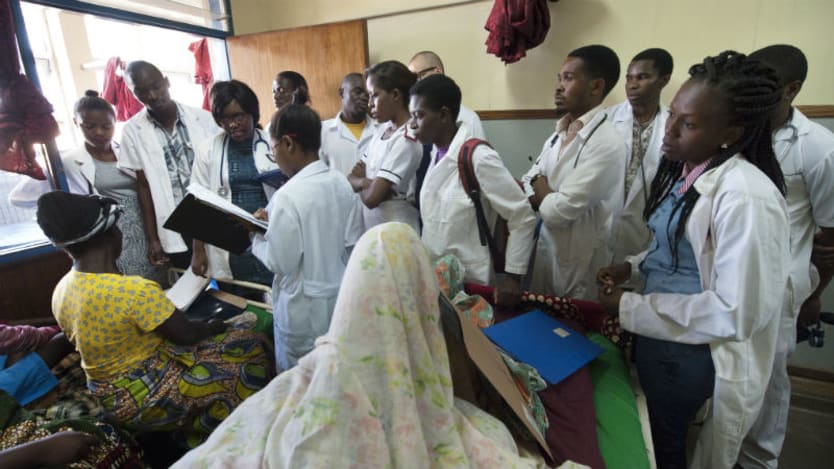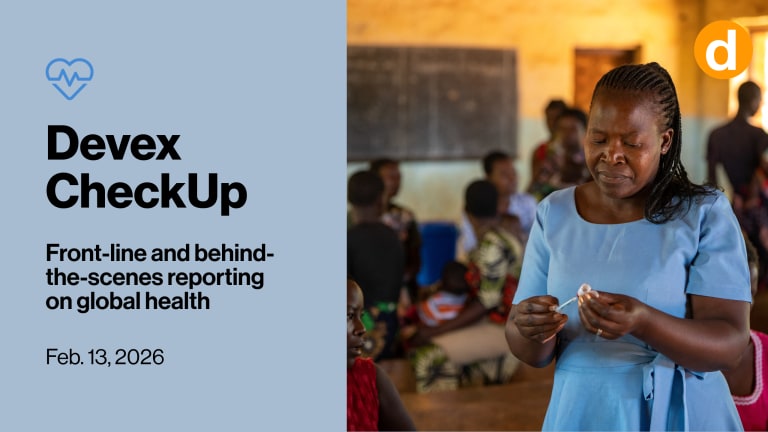
LILONGWE, Malawi — It was the death of his niece that led Rahim Bank to the field of medicine. Seven years ago, when the three-year-old girl began to show signs of malaria, the family delayed in bringing her to the hospital. They thought she would recover on her own. When they eventually did take her to the hospital, it was too late. She died of hypovolemic shock. Soon after, Bank enrolled in nursing school.
“It pained me a lot. Why did this girl die? I pursued nursing so I could know why she died,” he told Devex.
Malawi is in desperate need of trained health professionals in order to improve the quality of health care and also to educate communities on how to remain healthy. Of the over 42,000 openings in the public health sector in the country, only 45 percent of those roles are filled, according to the government. For key frontline clinical staff positions, such as medical officers, clinical officers, and nurse midwife technicians, this number is even lower. Only 33 percent of those roles are filled.
See more related topics:
► Could unemployed youth solve the health care worker crisis?
► New initiative leverages technology and philanthropy to reinvent community health care
► Ghana turns to community health workers in bid for universal coverage
► Opinion: Simplify the toolkit to help community health workers do the job right
After four years in school, Bank graduated in 2016. He then volunteered for six months at the Kamuzu Central Hospital, a referral hospital in Lilongwe, the capital city of Malawi. The hospital hired him as a hematology oncology nurse. He is one of the lucky ones. Of his graduating class of around 250 nursing students, less than two dozen of the graduates now have jobs in health care, he said. The majority of his classmates have been waiting around since graduation for now over a year for a job opening in one of the nation’s health care facilities.
Despite the immense need for health workers in Malawi and efforts in the country by educational institutes and nongovernmental organizations to train more health professionals across the country, the government has been slow to absorb new graduates. The government says this is because of budgetary restrictions and efforts to reform its recruitment process. The International Monetary Fund has also been steadfast in encouraging the government to curb public spending. At the hospital that Bank works, there are about 50 patients for every nurse, he said. The health worker shortage at his hospital sometimes leads him to work 18-hour days.
“The challenge we have is that there are a lot of trained nurses, but the government is failing to employ them,” Dr. Jonathan Ngoma, hospital director of Kamuzu Central Hospital, where Bank is a nurse, said in a recent meeting in Lilongwe. “It has no money.”
Training health professionals
In Malawi, there are .019 physicians and .283 nurses and midwives for every 1,000 people in the country, according to the Global Fund to Fight AIDS, Tuberculosis and Malaria. The World Health Organization’s standard is 2.5 physicians per 1,000.
The first hurdle is building the in-country training capacity to produce more health care professionals. Malawi currently has one medical school and 18 nursing training schools. Educational institutions and nonprofit organizations are working to improve the quantity of health care professionals and increase the number of specialized health care professionals in Malawi. For example, the College of Medicine, which has several campuses across the country, is currently educating the first cohort of students in a postgraduate program for family medicine doctors. Upon graduation, they will be the first family medicine doctors that have ever been trained in-country.
Seed Global Health, an American nonprofit, has sent health professionals to Malawi to train health professionals. One of their pilot programs is exploring whether a nurse with a master’s degree can do the role of a clinical nurse specialist. The role of clinical nurse specialist currently doesn’t exist in Malawi. Among other support, Seed Global Health provides up to $30,000 in debt relief to health professionals that come to train health workers.
One of Bank’s nursing school educators was part of the Global Health Service Partnership, which is a public-private collaboration between Seed Global Health, the Peace Corps, and the United States President’s Emergency Plan for AIDS Relief.
Programs that provide financial support to health care professionals are unique in Malawi, said Dr. Msandeni Chiume-Chiphalinali, head of pediatrics at Kamuzu Central Hospital. This is because most donors don’t want to funnel money into the salary of health workers, she said.
“They would rather buy something,” she said. “They find it easier to donate medical equipment.”
Strained government resources
Malawi’s population has grown by nearly 60 percent since the turn of the century, from 11.3 million in 2000 to over 18 million, according to the World Bank. This has had an impact on the government’s ability to deliver health services, Austin Atupele Muluzi, minister of health and population, said during a recent meeting in Lilongwe.
The government leans on external funding from development partners like the U.S. PEPFAR and the Global Fund, for help with hiring, Dr. Charles Mwansambo, chief of health services at the ministry of health, told Devex. For example, in November, the Global Fund gave the country $460 million in grants to fight tuberculosis, HIV and malaria. The Ministry of Health projects that it will spend $3.6 million of this grant, over the next two years, on health workers salaries. According to the Global Fund, this will lead to the hiring of about 850 staff members to support the response to these diseases. The government spent $3 million from the last Global Fund grant on health workers salaries.
The majority of the investments in the health sector in Malawi comes from external development partners, and only about a quarter of the funds come from government resources, according to the government.
The government has also been under international pressure to rein in public spending. The IMF previously suspended loans to Malawi for failing to cut its public sector wage bill. In an IMF review last year, the organization emphasized the need for Malawi to maintain a wage bill of 6.1 percent of gross domestic product.
The delays in hiring health professionals can be attributed to budget restraints, but also a change in the health worker recruitment process, said Mwansambo. Previously, the government did not interview candidates after graduation and just deployed them to health facilities, which was against civil service regulations, he said. The government is working to change that process, but these procedural adjustments are causing delays between when a candidate is interviewed and when a job is offered.
“We acknowledge that there have been some delays and that has led to the frustration of people that have graduated and have gone for some time without getting a job,” Dr. Bestone Chisamile, chief director of administration at the ministry of health, told Devex. “But we expect that we will be recruiting more.”
For recent graduates who are waiting around for an offer, the delays can be demoralizing, said Bank.
“They worked for four years, expecting to find work when they graduated, but now they remain at home, doing nothing,” he said.
Editor’s note: Seed Global Health facilitated Devex's travel and logistics for this reporting. However, Devex maintains full editorial control of the content.








